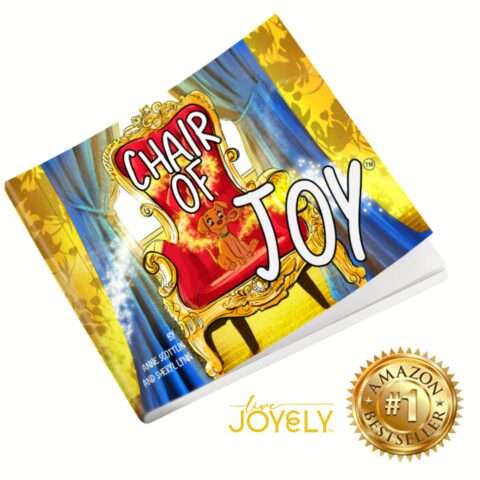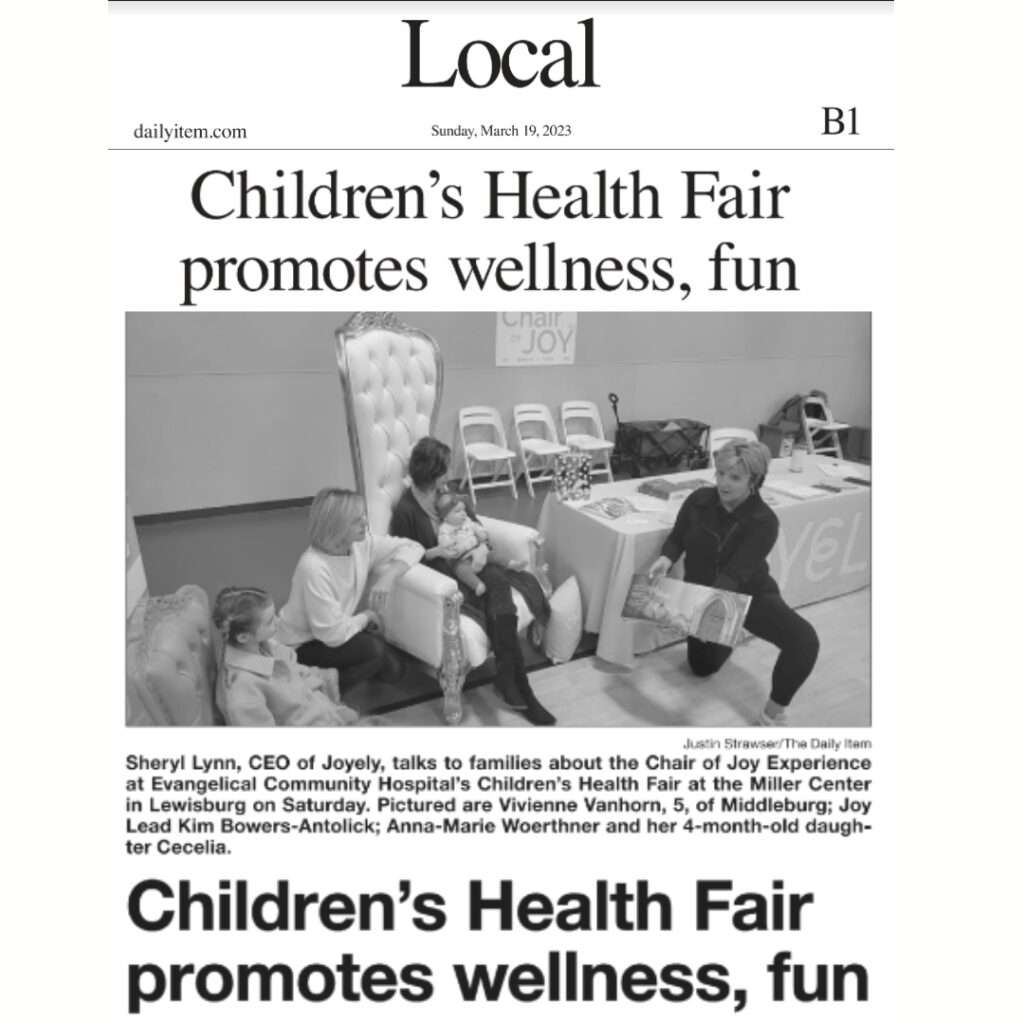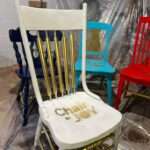We continue to have horrific tragedies, day after day, including mass shootings, suicide, and hate crimes.
What if we could reshape our educational system, and the way we parent to include a methodology that teaches personal responsibility about feeling better?
In recent years, time-outs have acquired critics who argue that the experience can be isolating and cause children to feel abandoned in their time of emotional crisis, leading to more power struggles instead of teaching children to regulate their emotions.
And that’s why It’s time to burn the time-out chair and start talking about the Chair of Joy™. What if we could reframe how we handle discipline when kids are out of control, misbehave or make a mistake?


In my 30 years of research around the science of joy, I have discovered a new way, and it’s called The Chair of Joy™ Experience. This process is an Interactive 4-step experience that helps people interrupt and diffuse feelings like stress and anxiety,
It allows for:
Would you be interested in doing a segment where we use any chair you have and transform it into a Chair of Joy™? I can also bring in my best-selling book called The Chair of Joy™, and even bring in an official kids’ Chair of Joy™ for an interactive experience.
Any chair, anytime, anywhere!


The Chair of Joy, in part, is an interactive 4-step experience that helps people interrupt and diffuse feelings like stress, anxiety, overwhelm, anger, and frustration and invites peace, gratitude, love, patience, and joy. It is a way to help others achieve more success with less of the negative feelings that are commonly associated with success.
The WHO’s 75th anniversary inspired Sheryl to release a children’s book called, The Chair of Joy™. Through her work, she has created a way for children and adults to be more joyful, using something as simple as a chair. The Chair of Joy™ works for children and adults by helping them cultivate an environment of sustainable growth. For children, The Chair of Joy can be a refuge when things feel hard to manage. Children come across various adversities and challenges when growing up. They often struggle with coping and adaptation skills. These events can have a strong impact on them. The Chair of Joy was founded on the belief that joy is essential to living a successful, fulfilling life. Health for all matters! And our kids’ mental health is at the heart of it all. Research shows that positive psychology intervention is effective in school-age children and adults alike. Sheryl calls to everyone to give less effort to the Time Out chair and direct more focus to the Chair of Joy.
In an article dubbed, Are Time Outs Bad? by Melinda Wenner Moyer, a New York Times science-based parenting columnist, Moyer[2] states that psychologists believe in practicing good “positive discipline” techniques, by stating facts rather than demands, using distraction to steer kids away from danger, and working out solutions as a family, should not need timeouts, or at least not very often. Clinical expert Dave Anderson and Child Mind Institute Family Resource Center’s writer Katherine Martinelli both state that time out “can be isolating and cause children to feel abandoned in their time of emotional crisis, leading to more power struggles instead of teaching children to regulate their emotions” [3]. It proves that timeouts can be ineffective, psychologically damaging, and worsen behavioral problems. But that’s not because they are inherently dangerous; it’s because so many parents and teachers misunderstand how they should be done.
The origin of the time-out chair goes back to the 1960s and is often credited to a renowned child psychologist and author, Dr. Thomas Phelan. He invented the concept of the “time-in” chair as a way to help parents and caregivers manage their children’s challenging behavior. The idea of a “time-out” chair was introduced in his book, 1-2-3 Magic: Effective Discipline for Children 2-12. It has been a source of controversy ever since, and many critics have voiced controversy over this technique in favor of more positive alternatives. BBC reported that “one study of the parents of 400 US children found that while more than 75% of parents reported using time out, 85% of them were using it in a way that ran counter to the evidence”[4].
The Chair of Joy™ is another option for the traditional time-out chair. The four steps to Joy™ provide an active, structured approach that focuses on improving the child’s emotional well-being. It encourages the child to take action and introduces them to the power of joy and optimism. It also helps the child to understand how to connect with and nurture their inner joy, to help them through difficult moments and challenging situations. It is a source of nurturing creativity in people so that they are capable of helping others and themselves.
We strive to provide safe circles so children can open up to the possibilities of friendships with peers and learn socially from individuals who may have gone through the same situations that they are going through. Sheryl recognized the importance of fostering a Culture of Joy for them through her Chair of Joy initiative. The Chair of Joy speaks to the urgency and need to take an inner look and find peace where it may be lacking. The practice alone can assist in creating a bridge between their real lives and their dream or fantasy world. Joyely’s Chair of Joy for Kids was founded with an understanding of the unique challenges that children face. The Chair of Joy is a place to practice self-care and learn how to navigate the world around them. It is a place to find comfort, joy, and acceptance from the people around them. It is a place to take a break, recharge and come back with more energy and enthusiasm for life. It is a place to practice gratitude, learn the power of gratitude, and be grateful for what they have.
The Chair of Joy for kids is essential as it is a place to learn how to forgive, accept, and love themselves. Unless an initiative like the Chair of Joy is called upon, children that are not able to find joy are more likely to develop health problems like depression, anxiety, and alcoholism, among others (Center on the Developing Child, 2007; Johnson, 1982). These changes in their lives often alter their minds, cause significant changes to their developing brains, and alter their perception of the environment around them. Troubling childhoods are known to lead to difficult adulthood and other developmental delays. These problems can be caught early and managed with the help of trained experts. AtJoyely, children are guided on how to find their peace and serenity and build resilience.
The Chair of Joy helps children learn how to recognize, accept, and healthily process their emotions. It helps them learn how to express their emotions constructively and develop self-regulation skills. It helps them recognize their triggers and to develop coping strategies. It helps them understand how to be mindful of their thoughts, feelings, and actions and to become more aware of the impact they have on their environment. It helps them learn how to recognize and accept their mistakes and how to develop an attitude of resilience, self-compassion, and optimism.
Teachers can use the Chair of Joy in their classrooms to help children learn how to better manage their emotions. By providing a safe and comfortable space, teachers can use the Chair of Joy to help children learn how to better understand and manage their emotions. They can also use it to help children practice self-regulation and to foster a sense of acceptance, understanding, and empathy.
The Science behind the Chair of Joy is supported by The School-Wide Positive Behavioral Intervention and Supports program [SWPBIS], which is a preventative maintenance strategy to help reduce behavioral issues in children. A study conducted by Bradshaw et al[5] on the universal prevention strategy currently implemented in over 16,000 schools across the United States indicated that positive behavioral interventions produce improvements in prosocial behavior, effective emotional regulation, a promising approach to problem alleviation, and promoting adjustment among elementary school children.
Children involved with the SWPBIS program showed
• Fewer behavioral issues at home and school,
• 33% less likely to be in trouble, and
• Less prone to being sent to the principal’s office over disciplinary issues.
What these and other studies show is that positive behavioral interventions work with several different age groups and backgrounds.
Why is joy important to our health and overall well-being?
1) Physical benefits – positive people are considered healthier individuals.
2) Mental benefits – those individuals that practice mindfulness through joy practices have less stress and depression.
3) Social benefits – overall, better relationships and a sense of belonging can lessen feelings of loneliness and isolation.
What if there was a way to benefit from joy every day and have our kids, as well as adults, access joy at any given moment? It is a fact that children at times find themselves in dangerous environments that close in on them where they spend their daily lives. Issues such as vicarious trauma, PTSD in a family member, intimate partner violence, neglect, abuse, abandonment, and exposure to substances leave them fighting off inner struggles that cannot be detected or seen without the help of a trained professional.


The majority of kids whose fathers, mothers, brothers, and sisters have gone to war and come back wounded either psychologically or physically have to cope with these daily struggles. Sometimes, they are no longer able to enjoy the relationships that once existed before the sudden or gradual change in the family setting. They lose the familiarity and express themselves only through play or non-verbal cues. At Joyely, we understand the need to help them feel comfortable in their own space and their own Chair of Joy.
At Joyely, the experiences that kids go through can be revealed as they tap into their unconscious minds. According to Freud, the individual’s personality comprises unique features that interact to form a whole, and each part makes a relative contribution to an individual’s behavior (Simply Psychology, 2022). Freud’s Psychoanalytic theory proposes that the mind is comprised of the Id, the Ego, and Super-ego. The id is the primitive and instinctual part of the mind that contains erotic and aggressive drives and hidden memories, the super-ego operates as a moral conscience, and the ego is the realistic part that mediates between the desires of the id and the super-ego (Mcleod, 2023). The unity of these three makes up the behavioral aspects of the child. The harmony and cohesion they feel when they can talk about these issues is a key step in their healing process. A good way to facilitate this first step is to put them in a space with other kids like them in some common areas.



Director, Miller Center & Community Health Initiatives at Evangelical Community Hospital
"We were thrilled to have Sheryl Lynn, who brought the Chair of Joy Experience and Book to the Children’s Health Fair, in partnership with the YMCA. The event occurred at the Miller Center, a joint venture of Evangelical Community Hospital and Geisinger. Sheryl and her team brought joy and connection to children who stopped by the bright booth with the big Chairs! The Chair of Joy offers an interactive and immersive experience that encourages children to explore their own sense of joy and connection with others. Children and adults participated and it was great fun!"



Director, Miller Center & Community Health Initiatives at Evangelical Community Hospital


At Joyely, we strive to create an environment that encourages young people to look within themselves and find the joy that is already there. Joyely helps children to cope with the issues that surround them both in the world we live in and psychologically.
Other stressful situations, such as a big move, a separation, a family death, and other changes, leave children feeling helpless (Morin, 2021). Joyely provides programs and practical solutions to handling stress for kids through such initiatives as the Chair of Joy and the SIT – BREATHE – THINK – FEEL steps that are certain to get anyone feeling better in 60 seconds. This neurocognitive technique has the power to unlock potential and help them develop resilience and coping skills. It has been proven to help children recognize their worth and enjoy the fruits of life without compromising their sense of self. Psychologists have found sufficient evidence to show that children are very vulnerable. Unless we take good care and proactively seek out the answers to the problems they are experiencing, we may miss out on the crucial identifiers. The moment they start to relive those memories, they begin to shut down and close off the world outside. The fears they bottle up inside require a lot of care and make for a good case for the use of the Chair of Joy.
Finally, children’s joy can be built up through practicing self-care and creating an environment that is full of joy. This sets them on a path of sustainable joy and growth. Through our global community of joy and connection, we hope to offer children of veterans, children that have undergone a sudden change, a big move, a separation, entry into adolescence, are at a certain age where they need support, or are seeking to excel in their various field. Joyely helps them create an environment and a path to a successful, fulfilling life.
Children have very imaginative minds, which have always had an unlimited ability to recreate dreams and fantasies through play and conversation the moment they can express themselves. Having an overly imaginative childhood could signal some developmental issues. The Chair of Joy is a starting point where they can begin to explore some of their realities and discuss their challenges. Joyely guides them and helps them develop a calm and more robust sense of self by helping them define those parameters that will later help them in the future as they go into the adolescent and adulthood stages. It could be the one channel that children have to reach into their subconscious and tap into their strengths and talents.
To see how Joyely and the Chair of Joy can assist kids, visit the JOYELY Chair of Joy children’s package and choose what suits your taste.
We can all work together to make sure those isolating Time Out Chairs can be removed once and for all for all families everywhere. And it is place, a Chair of Joy where there are llimitless possibilities. Every child needs that nudge to get to their best selves, and Joyely is here to make it a reality.
We invite School Administrators, Officials, and Executive Leaders to learn more and to read the Chair of Joy™ Book to their communities. This is a 5-minute read that is impactful for all ages.
I am not a trained psychologist, but I have lived a lot of life and was raised with spanking as the tool for most everything. I vehemently disagree with this method of fear based intimdateion, allowing for parent anger to take over.
Fast forward to when I raised my own children, I used the time-out chair on occasion. There are lots of things I did with my kids that reinforced all the things they did right, but I do remember asking then often, “Why can’t you just be happy?”
Then I learned why they could not “just be happy” all the time. They get to be all the emoint all day long.
When I invented the Chair of Joy in 2019 for myself, I quickly realized the benefits for children. The results are so good that some say that the Chair of Joy for Kids is revolutionary. When I take the children through the experience, it opens the eyes of both parents and kids that there is a new way to communicate about discipline. It helps children get to the other side of emotions, in a really beautiful way. It is not ignoring, diminishing, overly positive, isolating, or fear-based (focusing on what they did wrong).
Shirin Movahed Rakocevic, mother of 2, attorney, busy wife, sister, friend, and community member, says, “The Chair of Joy changed my life, and what it did for my kids is amazing. As a family, we can now communicate easier and get to a calmer place much faster.”
The Chair of Joy is a safe place to be in a warm, supportive, and loving environment. It is a place to be still, which is hard for kids and adults to do, to find their center, and to feel safe to express and explore their emotions. It is a place to practice self-regulation, find their inner strength and practice being kind and compassionate to themselves and others.






Sheryl Lynn is the Visionary and Founder of JOYELY, LLC, and The Chair of Joy™ Experience. She is also an Author, Podcast Host, and Facilitator of the science of joy. Sheryl Lynn is an inspirational leader in the Movement of Joy worldwide. She is the developer of a metacognitive strategy that uses the 4 principles; Sit, Breathe, Think, and Feel. The 4 simple steps allow for a universal language of joy that is worthy of celebration. Sheryl champions people to prioritize the concepts of sustained joy with daily effort. Sheryl has over 30 years of personal experience finetuning her own life which has set the stage for her to gift a Chair of Joy to kids, adults, executives, employees, and seniors so they can learn how to feel better from any chair, anywhere, anytime.
JOYELY’s Team consists of Culture of Joy Experts that specialize in mental health awareness and workplace success through customized programs, workshops, and keynotes. We do engagements both in person and online, including fundraisers. TheFse events are profound, yet fun, while interactive and life-changing. JOYELY.com
Center on the Developing Child (2007). The Impact of Early Adversity on Child Development (InBrief). www.developingchild.harvard.edu.
Johnson, J. H. (1982). Life Events as Stressors in Childhood and Adolescence. In: Lahey, B.B., Kazdin, A.E. (eds) Advances in Clinical Child Psychology. Advances in Clinical Child Psychology, vol 5. Springer, Boston, MA. https://doi.org/10.1007/978-1-4613-9811-0_6
Mcleod, S. (2023). Freud’s Id, Ego, And Superego: Definition And Examples. Simply Psychology. https://simplypsychology.org/psyche.html
Morin, A. (2021). How Stressful Life Events Affect a Child’s Behavior. VeryWellFamily. https://www.verywellfamily.com/how-stressful-life-events-affect-a-childs-behavior-357200
[2] https://melindawmoyer.substack.com/p/are-time-outs-bad
[3] https://childmind.org/article/are-time-outs-harmful-kids/
[4] https://www.bbc.com/future/article/20220607-what-should-you-do-when-a-child-misbehaves
What we do at JOYELY in our corporate programs offers products and services that promote joy in the workplace. The Culture of Joy programs offer team-building activities, wellness programs, and training sessions on work-life integration. We make sure all interactions are engaging, interactive, fun, and relatable, as well as easy and simple to understand.
JOYELY’s Chair of Joy Experience and specialized joy-enhancing techniques help increase productivity and build upon profitability strategies while decreasing turnover. We do all this while creating a healthier and more successful business.
Each company we work with is unique! At JOYELY, we consider the needs and values of each corporation we decide to work with. For example, we pay particular attention to the company mission and make sure there is an alignment of our approach and joy with the company’s mission or values.
Overall, we clearly communicate with corporations the extreme value of joy and the powerful science that backs a Culture of Joy. Our own unique research is outlined in the article, 21 Science-Based Reasons Why a Culture of JOY Is the Most Important Decision Your Company Can Make in 2023 will begin to create great results quickly.
We offer a 1–2-hour complimentary COJ Experience to select companies as an example of the Year of Joy Corporate Program.
Simply reach out to our JOYELY Team at www.joyely.com or you are welcome to connect with our founder, Sheryl Lynn at 949-303-5219 or sheryl@joyely.com
It’s time to immerse ourselves completely in the conversation of joy, to prioritize it above most things.. There’s no time to wait; it’s a matter of life and death.
Your Answer Matters!


We invite you to share your valuable experience. Your feedback not only guides future guests but also illuminates our path towards excellence. Please take a moment to leave a review and help shape our journey forward.



Welcome to JOYELY, where JOYELY Ever After is not just a dream, it’s our lifestyle.
© 2024 JOYELY. All Rights Reserved.